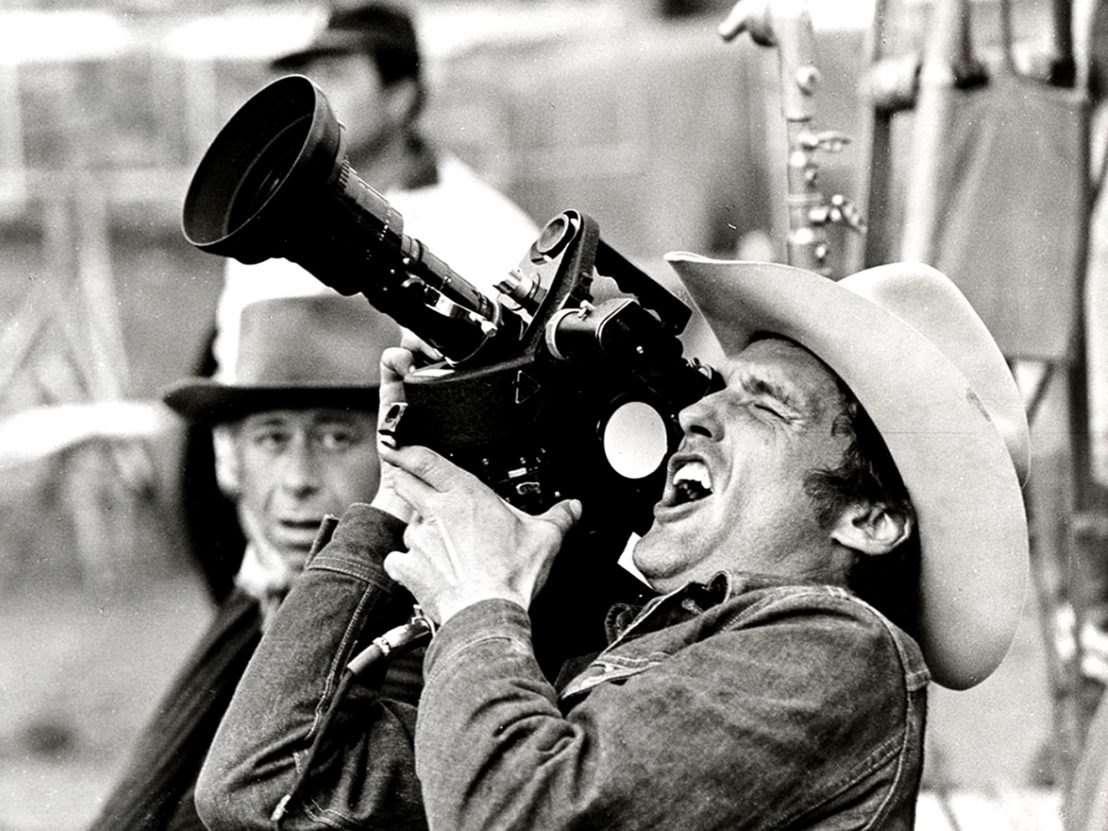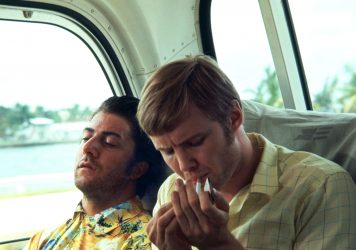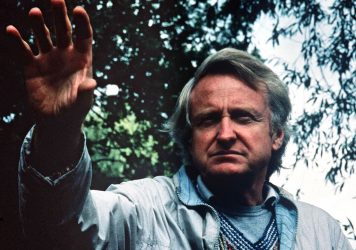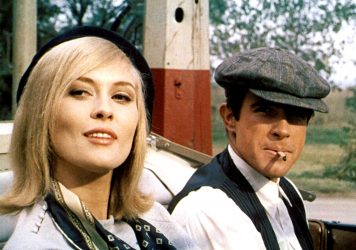
The 1960s was a time of major social and political upheaval. In Hollywood, change was in the air as censorship and obscenity laws became looser and the studios faced the increasing threat of bankruptcy. This provided a perfect storm for young creative talent to emerge, and there was an overwhelming appetite for something fresh, something different.
These conditions allowed a new cinema to manifest from within the Hollywood mainstream. These were uncompromising, visceral, provocative films – the antithesis of what had come before. Where cinema had always been about distance from reality and escapism, this ‘New Hollywood’ was concerned with intimacy and realism. It alienated the family audience and challenged moviegoers with its incendiary and confrontational style. It was a watershed moment, producing in its wake some of the all-time greats.
Scorsese, Coppola and Spielberg are among the most notable filmmakers associated with this revolutionary era. But they were certainly not alone in creating a new visual language for American cinema. Here are 10 essential New Hollywood directors.
The Graduate is generally seen as the catalyst for the New Hollywood movement. It distinguishes two very distinct generations falling away from one another. The film was unique for its dispossessed melancholic protagonist and its controversial plot point of a young man being seduced by an older woman. The Graduate captured the sentiment of a generation, burdened by new ideas but not yet able to articulate them. Artfully shot and characterised by the songs of Simon & Garfunkel, it spoke of its time and the future all at once.
George Roy Hill’s violent western Butch Cassidy and the Sundance Kid signifies a discernible transition in Hollywood from old to new. The film which was uncharacteristically violent for the genre deconstructs the American myth of the west and confronts the wholesome and righteous ideology perpetuated by classic westerns. Butch Cassidy puts emphasis on the wild and lawlessness of the West. Many filmgoers hated it upon its release, it alienated audiences and distanced itself ideologically from the old guard. Hill remained vitally important during this period, later directing the likes of Slaughterhouse-Five and The Sting.
If The Graduate unlocked the door, Easy Rider blew the hinges clean off. Dennis Hopper’s iconic road movie defined the spirit of 1969 like no other. Culturally, Easy Rider is the moment the counter culture infiltrated the mainstream, making Peter Fonda and Dennis Hopper megastars overnight. It was shocking in its portrayal of sex, drugs and lawlessness and embodied the anti-authoritarian ideology permeating the American youth. Its rejection of wholesome American values sent shockwaves throughout the nation. But it’s the wandering aimlessness and ambiguous and disconcerting ending which stayed with audiences long after the credits rolled.
Midnight Cowboy is among a shortlist of films which epitomises the time it was made. Its story centres around a gay hustler struggling in New York and illustrates the radically changing world it inhabits. The cowboy get-up Joe wears symbolises a certain erroneous and archaic model of masculinity which has become outdated and irrelevant. It is as bold a film as they come and in 1969 it was downright heretical. It celebrated the changing identity of American culture and depicted a reality steeped in realism, adversity and destitution. With terrific performances from Jon Voight and Dustin Hoffman, it is a crucially important emblem of its time.
Caught in the hangover of Easy Rider, Five Easy Pieces speaks of a longing and restlessness felt by a generation whose ideology had failed them. Bob Rafelson’s essential film illustrates the itinerant searching and wandering which befell many young people of the hippie generation. It deals with class and identity and the conflict which exists between the new emergent youth and their parent’s conservatism. Five Easy Pieces catapulted Jack Nicholson’s career and distilled the New Hollywood explosion into its essential components. The film is an emotive portrait of America, a snapshot of a future without a vision.
Deliverance exposed mainstream audiences to the sort of violence and savagery they had previously been sheltered from. Notorious for its depiction of male rape, Deliverance taps into a wild and uncivilised America which exists just beyond society. An undeniably confrontational and controversial film, it subverts the great American outdoors and turns the wholesomeness of the men’s fishing trip into something frightening and threatening. It is remembered for its ‘Duelling Banjos’ musical number, but the true legacy of Deliverance is how it shocked audiences. Perhaps the crucial film of the New Hollywood as its challenging and provocative nature cannot be understated.
Serpico tackles pressing issues of the time such as police corruption, the proliferation of crime and an inherent suspicion and mistrust of authority. Quintessentially New Hollywood in its anti-establishment leanings. Sidney Lumet’s Serpico is a gritty and intimate foray into police corruption on the streets of New York. Police movies were hugely popular after the success of The French Connection and the ’70s cop film addressed a harsher urban reality that audiences were not used to seeing. Lumet’s work on Serpico is bold and striking. The film is often overlooked, eclipsed by more iconic films such as Mean Streets or Taxi Driver. But Serpico is every bit as great, with an electrifying Pacino performance and vibrant, inspired filmmaking from Lumet.
William Friedkin followed his Oscar-winning The French Connection with one of the most iconic and incendiary films of all time, The Exorcist. Audiences had never been frightened by a film like this before. They were appalled and horrified by it; many outright despised it. It is significant for so many reasons, not just as a landmark horror film, but a moment in history when everything changed. The Exorcist was an affront to moral decency and the Christian foundation of America. It eradicated any sense of comfort going to the movies ever guaranteed and reflected the confrontational psyche of an America in transition.
Miloš Forman’s adaptation of the Ken Kesey novel ‘One Flew Over the Cuckoo’s Nest’ is a social commentary at its core, but the director constructs a film of soul-stirring intimacy. It scrutinises the institution of society and tackles the notion of identity, masculinity and behavioural conditioning. The film speaks openly to a generation actively in conflict with authority and suspicious of the institutions they propagate. It is more sentimental than other films of the time, with an oddly uplifting tragic finale.
The film that made a star out of John Travolta and helped make disco dominate the late ’70s. True to the style of the New Hollywood, Saturday Night Fever is gritty, filthy, visceral filmmaking. Dealing with racial and social tensions and depicting the ordinary lives of young people who are still trying to have a good time in a hostile and difficult America. The film is most iconic for its dance sequences and use of music by the Bee Gees, but Badham remains an unappreciated but vital voice in this wave of American filmmaking. He crafts a film with real pulse and swagger and establishes a cinematic language entirely of its own. It remains one of the defining films of its era.
Published 23 Jun 2018

Adam Holender and Michael Childers reflect on the making of this iconic New York movie.

By Matt Thrift
The legendary British director of Deliverance, Excalibur and Zardoz looks back over his extraordinary career.

Arthur Penn’s seminal crime thriller owes a lot to the likes of Jean-Luc Godard and François Truffaut.